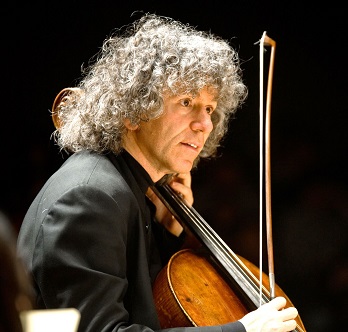 United Kingdom Schumann and Fauré: Veronika Eberle (violin), Arisa Fujita (violin), Amihai Grosz (viola), Steven Isserlis (cello), Connie Shih (piano), Wigmore Hall, London, 23.4.2019. (AS)
United Kingdom Schumann and Fauré: Veronika Eberle (violin), Arisa Fujita (violin), Amihai Grosz (viola), Steven Isserlis (cello), Connie Shih (piano), Wigmore Hall, London, 23.4.2019. (AS)

Schumann – Fantasiestücke Op.73; Piano Quartet Op.47
Fauré – Piano Quintet No.1 in D minor Op.89; Romance Op.69; Elégie Op.24
Though Schumann composed his Fantasiestücke for clarinet and piano, he also indicated that the clarinet part might also be played on the cello or viola. Since then the three pieces have also been adopted by violinists, and it was in this form that we heard Veronika Eberle (replacing the indisposed Janine Jansen), give them a warmly sympathetic performance with Connie Shih to start the evening’s programme. Eberle’s lovely, mellow tone quality was a joy to hear and Shih’s delicate and sensitive playing matched her well. This was the latest concert in Steven Isserlis’s Fauré/Schumann Project series, given in collaboration with the Wigmore Hall, and it was even more successful than those that I heard in November and March – in all three recitals Isserlis has been partnered by completely different artists.
Next came Fauré’s Piano Quintet No.1 – the only work in which all five players were involved. There was a wonderful sense of rapport between them, even though they had probably not all played together before. They also showed perfect identification with Fauré’s elegant, quietly sensuous style, though in the second movement Adagio the brief passage where tension and passion become heightened came into being very effectively. It was probably Isserlis’s close personal identity with the French master’s music that influenced or even inspired his colleagues in the creation of such sympathetic artistic unanimity.
That closeness with the composer was then made manifest in Isserlis’s beautiful, aristocratic rendering of Fauré’s two short pieces for cello and piano, Romance and the very well-known Elégie. Phrasing and the quality of tone production were as good as could be.
In Schumann’s Piano Quartet there was a need for the pianist to assume a more prominent role than in the previous pieces. Connie Shih had played impressively before, but now her extraordinarily vital yet acutely sensitive playing could be appreciated the more. She has a superlative technique, she produces a remarkable range of tone quality, she has a finely tuned sense of phrase and rhythm and she is altogether a complete artist. Less well known than her colleagues she may be at present, but surely her talents will be increasingly recognised in time, and Isserlis’s choice of her as pianist was well justified. The performance as a whole had splendid confidence and élan: the gently moving, rocking rhythm of the third movement Andante cantabile, for instance, was strongly conveyed and formed an effective base on which some heartfelt solo playing was to be heard. A strongly delivered account of the last movement, the Vivace marking faithfully observed, provided both a good contrast and a satisfying end to the work and to the concert.
Alan Sanders